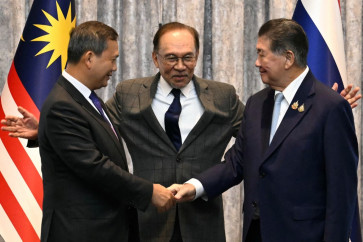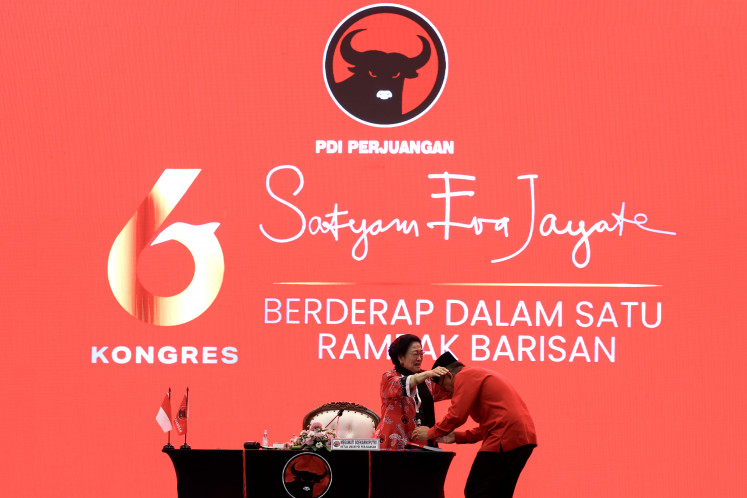Popular Reads
Top Results
Can't find what you're looking for?
View all search resultsPopular Reads
Top Results
Can't find what you're looking for?
View all search resultsHonorary degree: The right move at the wrong time
Reaction to the honorary degree awarded by University of Indonesia (UI) to King Abdullah of Saudi Arabia has been mixed
Change text size
Gift Premium Articles
to Anyone
R
eaction to the honorary degree awarded by University of Indonesia (UI) to King Abdullah of Saudi Arabia has been mixed.
Human rights and labor activists seem to be in the front line protesting the award, but the majority of people, including 1.5 million Indonesian migrants currently working in the kingdom are not bothered by it. The issue — compared to Muhammad Nazaruddin’s corruption case, for example — is simply not something of concern to them.
The plan by the House of Representatives’ Commission IX overseeing people’s welfare to summon UI rector Gumilar Rusliwa Somantri to seek clarification demonstrates that the award is no longer just an academic issue. It has become political, if not politicized.
Obviously the discourse now has both academic and political dimensions, which in many ways are incompatible. However, even if compromise is not reached, we still benefit from having engaged in this controversy.
The lesson learned; universities, regardless of their academic authority, should exercise sensitivity towards current problems facing the people.
A doctorate degree is certainly an academic matter but when conferred as an honorary degree, it is not purely academic. It is not part of the primary academic objectives of the university. Instead, it fulfills a social function for the university; promotion, recognition and extension. In the long run such undertakings are supposed to generate either tangible or intangible benefits for the university.
An award recipient, either individual or institution, should meet a set of criteria that are not necessarily academic. In general, he or she should be knowledgeable about his or her field and demonstrate a commitment to the field of, say, education, economics, social services, religion or the environment for example. His or her expertise, dedication and commitment must have social and even global impact.
Awarding an honorary doctorate degree is not the prerogative of a rector. The academic senate is usually mandated to nominate a group of candidates before collectively choosing potential recipients who fulfill the set criteria.
The rector and the senate should consult closely to make sure that the recipients are the right people. All members of the academic community in the campus are informed about candidacy and selection, and when a decision is made everybody supports and takes pride in it.
As reported in the media the award to the Saudi King has sparked anger and protests from intellectuals and the campus community. In higher education, criticism is giving way to reflection. The rector’s office should be aware that some elements within the campus are questioning the justification of the award.
Once it reaches the House, it would become a burning issue for political discourse, where political interests silence academic voices. Some have expressed fury, disappointment, intimidation, or just concern in the following terms.
First, the Saudi King does not deserve such an award due to the country’s notoriety in handling Indonesian migrant workers. Many have said that the country does not respect human rights. The question is: by what criteria?
The fact that 23 migrant workers are on death row is not to be blamed on the Saudi government. We should realize that most of our migrant workers are poorly educated. They are often ignorant of Saudi laws and regulations. Is it not our failure that they are not provided with appropriate training? Many of the workers are just hopeless victims of corrupt Indonesian recruitment agencies.
Saudi Arabia is an independent country, taking pride in implementing traditional Islamic laws as much as Indonesia is proud of observing our jurisdiction. Imposing international laws in lieu of domestic laws is simply groundless. Are we willing to replace Pancasila with other ideologies imposed by international agencies?
The kingdom has been a haven for 1.5 million Indonesian migrant workers, who would otherwise be jobless and a burden to the government. From this point of view, we should appreciate the kingdom. The moratorium on migrant workers is just lip service and a temporary policy, for we can barely create enough alternative jobs for them here.
Second, the rector has to withdraw the award. This suggestion is embarrassing and counterproductive. Such a withdrawal would humiliate the king, whose appreciation of the award was probably not as much as was expected by the UI.
With regards to higher education, like it or not, UI in many respects is the best representative of Indonesia, and such a withdrawal would damage existing relations between the two countries. By any measure Indonesia gains more from the current relations than Saudi Arabia.
Third, the award has demeaned the university’s reputation. I am not so sure about this. Ostensibly such a withdrawal could be seriously detrimental to the university’s reputation. Despite the controversies in the academic senate, this award has brought the university to public attention in the Middle East.
At this juncture it is relevant to note that the number of Arabic-speaking students in Indonesia is very small, compared to those studying in Malaysia. Indonesian universities are less well known by Middle Eastern students. The presence of 1.5 million Indonesian immigrant workers in Saudi Arabia does not necessarily build a good image or reputation of our universities.
Quality-wise some Indonesian universities are comparable to their Malaysian counterparts and are capable of hosting Middle Eastern students. It is hoped that the honorary award will pave the way for the arrival of foreign students to Indonesia.
The bottom line seems to be an internal conflict within UI, driven by various factions, which is a common phenomenon in such a big and dynamic campus.
Being internally politically driven, the upheaval will soon die out when a level of agreement has been attained. We are waiting for clarification by the UI rector before House Commission IX.
Within higher education, critical discourse involving intellectuals and NGOs is to be seen as the development of wisdom. “Rivalry of scholars advances wisdom,” so said a Hebrew proverb. The wisdom of a university lies in the willingness to hear voices from campus stakeholders and being sensitive to public cognition and sentiment.
Still alive in the mind of most Indonesians is the bitter memory of the beheading of Ruyati binti Satubi, convicted for murdering her employer. This shameful incident is one thing and the degree granting is something else.
But we cannot order the public to see them separately. To conclude, the award is simply the right action at the wrong time.
The writer is a professor at Indonesia University of Education, Bandung, and member of Education Council, Board of Higher Education.










